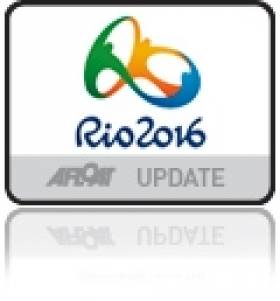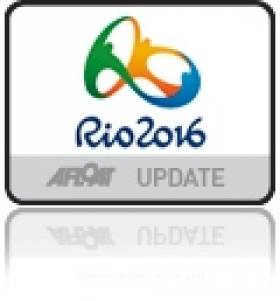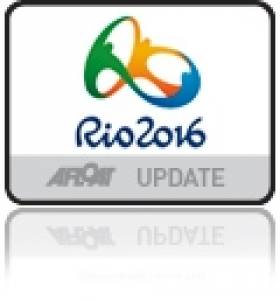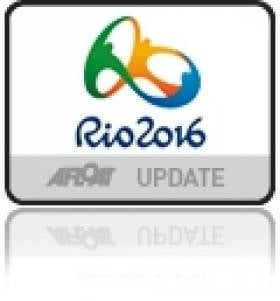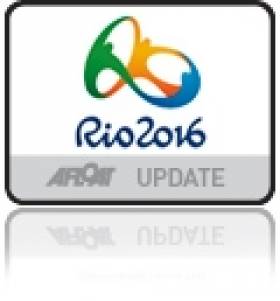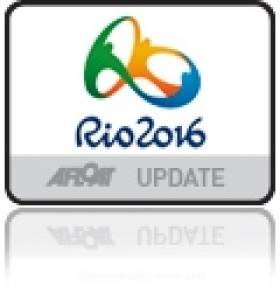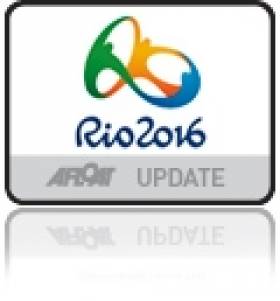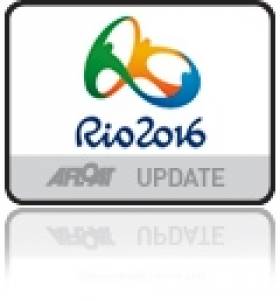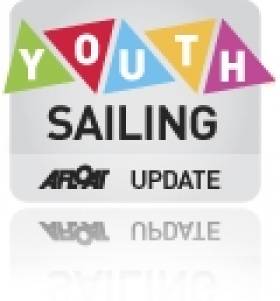Displaying items by tag: Olympics
Rower Of The Year Sanita Puspure Gives Update On Her Road To Rio
#Rio2016 - Afloat's Rower of the Year for 2014 Sanita Puspure has her sights set on the European Championships next month, the next big step towards qualification for the Rio 2016 Olympic Games.
In the latest update on her progress for the Olympic Council of Ireland, the single sculls rower and scholarship athlete – who competed for Ireland at London 2012 – did not have the best performance at her most recent regatta in Italy due to illness.
But the last few months of training, following a few setbacks, have gone "really well" – and the training continues towards the World Championships coming in August, at which only nine rowers will qualify for Rio.
"We are going to test ourselves in the World Cup 3 in Switzerland in July before we head to fight for qualifying places," she says. "But in the meantime it's a 'one step at a time' approach. Training hard, dreaming big."
Rio's Sailing Waters Won't Be Clean For 2016 Olympics
#Rio2016 - Olympic officials have confirmed that Rio's sailing waters will not be fully cleaned up in time for next summer's Games.
According to Reuters, the Brazilian Olympic Committee (BOC) announced at a press conference last week that only the sailor's lanes in Guanabara Bay would be cleared of floating rubbish and not the whole body of water.
The statement back-pedals on their previous commitment, part of their bid for the 2016 Games, to reduce pollution by 80% in waters described as "absolutely disgusting" by Irish Olympic sailing coach Ian Barker.
BOC head Carlos Guzman declared that the "area of competition for the Olympic Games will be ready... Our obligation is to deliver the area for competing during the Games."
The announcement comes not long after a programme to retrieve flotsam and jetsam from the notoriously polluted waters was halted by city officials.
Rio has announced a "review" of that programme, but it's not yet known whether it will employ technology developed by Dutch researchers to help focus clean-up efforts in the worst affected areas of the bay.
It's also not clear what measures officials will take over the emergence of a new 'super-bacteria' in the city's waters, fed by a number of heavily polluted rivers and raw effluent streams.
Rio Turns To Tech To Fight Water Pollution Problem
#Rio2016 - Rio is turning to Dutch researchers for help in combating its water pollution problems that continue to cause concern for the Olympic sailing fleet.
As the Associated Press reports, water research foundation Deltares has developed technology using data collected from both weather and water conditions to predict areas where litter accumulates, allowing Rio authorities to focus their clean-up efforts more efficiently.
It comes some days after a programme to retrieve floating rubbish from the sailing venue in Guanabara Bay was halted by city officials, reviving fears that Rio's 'dirty water problem' will not be solved in time for the 2016 Games.
Objects floating in the water have been cited as a major cause of concern by both Olympic and world sailing organisers, but water-borne contaminants have also been highlighted.
Last December news emerged of a newly discovered 'super-bacteria' that could pose a significant threat to health at next year's Summer Olympics for competitors like Annalise Murphy, James Espey, Ryan Seaton and Matt McGovern who have already nabbed their spots and will be training in Rio's "absolutely disgusting" waters ahead of the Olympics.
The Associated Press has much more on the story HERE.
'Super-Bacteria' Concern For Rio 2016 Sailing Waters
#Rio2016 - A newly discovered 'super-bacteria' could pose a serious threat to the health of sailors competing at the next Summer Olympics in Rio.
According to Reuters, scientists in the Brazilian city have found a strain of bacteria that can cause any number of internal infections – but is resistant to antibiotics.
The bacteria was discovered in samples taken from a river that feeds into the main sailing grounds for Rio 2016 at Guanabara Bay.
The latest news will be of grave concern to sailors like Annalise Murphy, James Espey, Ryan Seaton and Matt McGovern who are already headed to Rio and will frequent the city for competitions and training camps over the next 18 months leading up to the games.
It also comes after the disappointing news earlier this year that pollution issues in Rio's waters will not be solved in time for the Olympiad - a year after Irish Olympic coach Ian Barker described the city's waters as "absolutely disgusting".
Cash Injection For Ireland's Rio Olympics Campaign
#Rio2016 - Irish sailing will share in a €2 million boost from the Minister for Sport for the nation's Olympic campaign at Rio 2016.
As the Irish Examiner reports, the ISA will get a €70,000 share to fund its pre-games team base in the Brazilian host city, where the likes of already Rio-bound sailors Annalise Murphy, James Espey, Ryan Seaton and Matt McGovern will get all the training hours they need to challenge for gold.
This is on top of the €500,000 Sports Capital Programme grant to Irish sailing clubs earlier this year.
Meanwhile, Ireland's focus on sailing success at the Rio Games was confirmed with the Irish Sports Council's designation of ISA performance director James O'Callaghan as the sport's 'team leader' under overall chef de mission Kevin Kilty.
The Irish Examiner has more on the story HERE.
Irish Improve In ISAF World Rankings After Santander
#Santander2014 - With the last races sailed at the 2014 ISAF Worlds in Santander, the biggest plaudits are going to the new world champions who've seen their stock rise in the global rankings.
But they're not the only ones with reasons to celebrate, as Ireland's sailing team have added to their impressive performances in Spain last week with a strong showing in the latest world sailing tables announced today (23 September).
Not content with being Ireland's first Olympic qualifier, James Espey has jumped four places in the Men's Laser rankings from 62nd to 58th. But he's not even the biggest riser among the Irish.
That accolade goes to Laser prospect Finn Lynch, who didn't have much to write home about in Santander but still rocketed from 296th in the world to 194th: a remarkable improvement of 102 places. Well done, Finn!
Andrea Brewster and Saskia Tidey may have narrowly missed out on Olympic qualification in the 49erFX, but they've jumped two placed in the world table from 29th to 27th – not bad at all for the development duo who've only been sailing together for a year.
Holding steady, meanwhile, are Rio-bound Annalise Murphy at 18th place in the world Laser Radial rankings, and Ryan Seaton and Matt McGovern, who are just one spot off the world top 10 in the 49er class.
It wasn't the best performance for independent Irish sailor Ross Hamilton, who slipped two places from 59th to 61st in the Finn class, but he will have further opportunity to improve his position and stake claim on a coveted spot in Rio for the 2016 Olympics.
Rio 2016 Olympics Ticket Prices Announced
#Rio2016 - With Ryan Seaton and Matt McGovern, James Espey and Annalise Murphy all qualified for the next Olympic Games at the ISAF Worlds last week, Irish sailing fans will be interested to know that ticket prices for Rio 2016 have been announced.
As the Olympic Council of Ireland reports, more than half of all tickets will be sold at accessible prices in order to ensure that the event is open to everyone.
About 7.5 million tickets will be issued, and some 3.8 million of these will be available for 70 Brazilian reals – €23 at the current exchange rate - or less.
The price list is available as a PDF to read or download HERE - and sees the sailing sessions at Copacabana priced between 40 and 100 reals (€13-33).
The full Rio 2016 ticket sales programme will be unveiled in November, along with the competition schedule and details on how the public can buy tickets. Brazilian residents will be able to enter the first of two draws for tickets in March 2015.
Non-Brazilian residents will be able to apply to buy tickets in their own territories in the first half of 2015 (details to come) and then again in January 2016 in the worldwide first-come-first-served online sales phase.
James Espey Climbs The Rankings After ISAF Worlds Day 3
#Santander2014 - Not one to rest on his laurels after securing his place at the Rio Olympics – the first Irish sailor to do so – Belfast Laser helm James Espey made the most of Day 3's light winds to climb up the rankings at the ISAF Worlds in Santander.
Few fleets managed to get any racing in, and even at that there were frustrating delays before their class sprints were abandoned. But Espey remained cool and calm where many of his Gold Fleet competitors let their nerves get to them – nine disqualifications for crossing the line early was the result.
When the race did get under way, Espey sailed with the leading pack the 4-8 knot breeze, only slipping down in the second half to finish 10th, leaving him in 26th place overall – 14 places higher than where he finished yesterday.
Meanwhile, in the women's Laser Radial Gold Fleet, Annalise Murphy was unable to repeat yesterday's impressive recovery when she got caught out on the wrong side of the fleet and had to settle for 37th. The Olympic hero is now 45th overall in the 60-boat fleet.
There was no race today for Finn Lynch with the Laser Standard Bronze Fleet abandoned, though tomorrow's rest day may be rescheduled if the winds are favourable to make up for today's lost action.
Also on the water tomorrow for Team Ireland will be Ryan Seaton and Matt McGovern in the men’s 49er class, Andrea Brewster and Saskia Tidey in the female 49erFX and Ross Hamilton in the Finn fleet.
Finn Lynch Wins U19 Laser Standard World Championship
#FinnLynch - Aspiring Olympian Finn Lynch is the new U19 Laser Standard World Sailing Champion.
The Carlow native made a comeback this afternoon (Saturday 23 August) at the U21 Laser Standard & Radial World Championship in Douarnenez, France to win gold in the U19 category.
The regatta began on Monday 18 August and after 10 races in varying, shifty conditions, Lynch lay eighth overall in the 101-boat fleet and third among the U19s.
The final race began this afternoon and Lynch, with his eyes on the prize, got off to a great start and battled it out at the top of the fleet throughout the 40-minute race.
He crossed the line to finish third, comfortably ahead of overnight U19 leaders Joel Rodriguez from Spain and Maxim Nikolaev from Russia, to claim the U19 world title and gold medal.
And he just narrowly missed out on the U21 bronze, finishing fourth overall in that category.
This is a significant achievement for Lynch, having only graduated to the senior Laser Standard class earlier this year.
In less than three weeks’ time he will compete alongside fellow Laser Standard sailor James Espey from the Irish Olympic Sailing Team - Providence Team IRL in Santander, Spain at the first 2016 Olympic qualifier event.
During this championship, Lynch will be aspiring to finish within the top 23 nations in order to qualify Ireland for the Rio Games.
Meanwhile, Lynch's teammate Fionn Lyden from Cork finished an impressive 11th overall.
And in the female Laser Radial class, Tipperary local Aisling Keller also narrowly missed out on a medal, finishing fourth in the U19 category and 22nd overall.
#YouthSailing - US sailor Morgan Reeser gave an inspiring talk to over 50 young sailors, their instructors and a few parents at Sutton Dinghy Club on Thursday 3 July, writes Andrew Johnston.
Reeser's son Nicolas has been a regular attendee at courses in Sutton the last two summers while on holiday in the locality, and this week has been sailing in Sutton Creek with his father and some of the other trainees.
Morgan Reeser, a 470 Olympic silver medallist in Barcelona 1992, is currently coaching both the US and Austrian Olympic 470 hopefuls and successfully coached the Greek 470 women's team to Olympic gold in Athens 2004 and the British 470 men to Olympic silver in Weymouth during London 2012.
He talked to the juniors about his first 'start sailing' course in Miami in an Optimist, as well as some of his sailing heroes and the coaches that inspired him.
Reeser also remembered his first visit to Dublin in 1981 for an inter-country team racing event sailed in Shamrock half-tonners in Dun Laoghaire, and obviously about his preparation for the Olympics in Barcelona in 1992.
His abiding memory of the final race of the regatta, after finishing in a tight bunch, was that he and his crew Kevin Burnham didn't find out till they reached the marina 40 mins later that they had won a medal.
He outlined the fine margins between medaling and missing out at events, explaining they would have been out of the medals altogether if they had dropped a single place in their best race at the regatta, which happened to be a race win.
Reeser was back at the Olympics in Atlanta in 1996 and while he failed to take a medal, he met his future wife, none other than Irish Olympic 470 sailor Louise Cole.
The winning of an Olympic medal is obviously a fantastic memory for Reeser, but one of his best memories is of the opening ceremony in Barcelona and the opportunity to meet up with top-class athletes from around the world.
Since turning to coaching, Reeser has encouraged his Olympic hopefuls to attend the opening ceremony as this is one of the things that make it the 'Games' and not just another regatta.
Sutton Dinghy Club Commodore Andy Johnston presented Reeser with a club burgee and thanked him for taking the time drop in and talk with the club's young sailors and their instructors.
Before getting back on the water, many of the kids availed of the opportunity to get the autograph of a fully fledged Olympic medalist on what was a memorable morning for the young sailors and indeed for all in attendance.



























